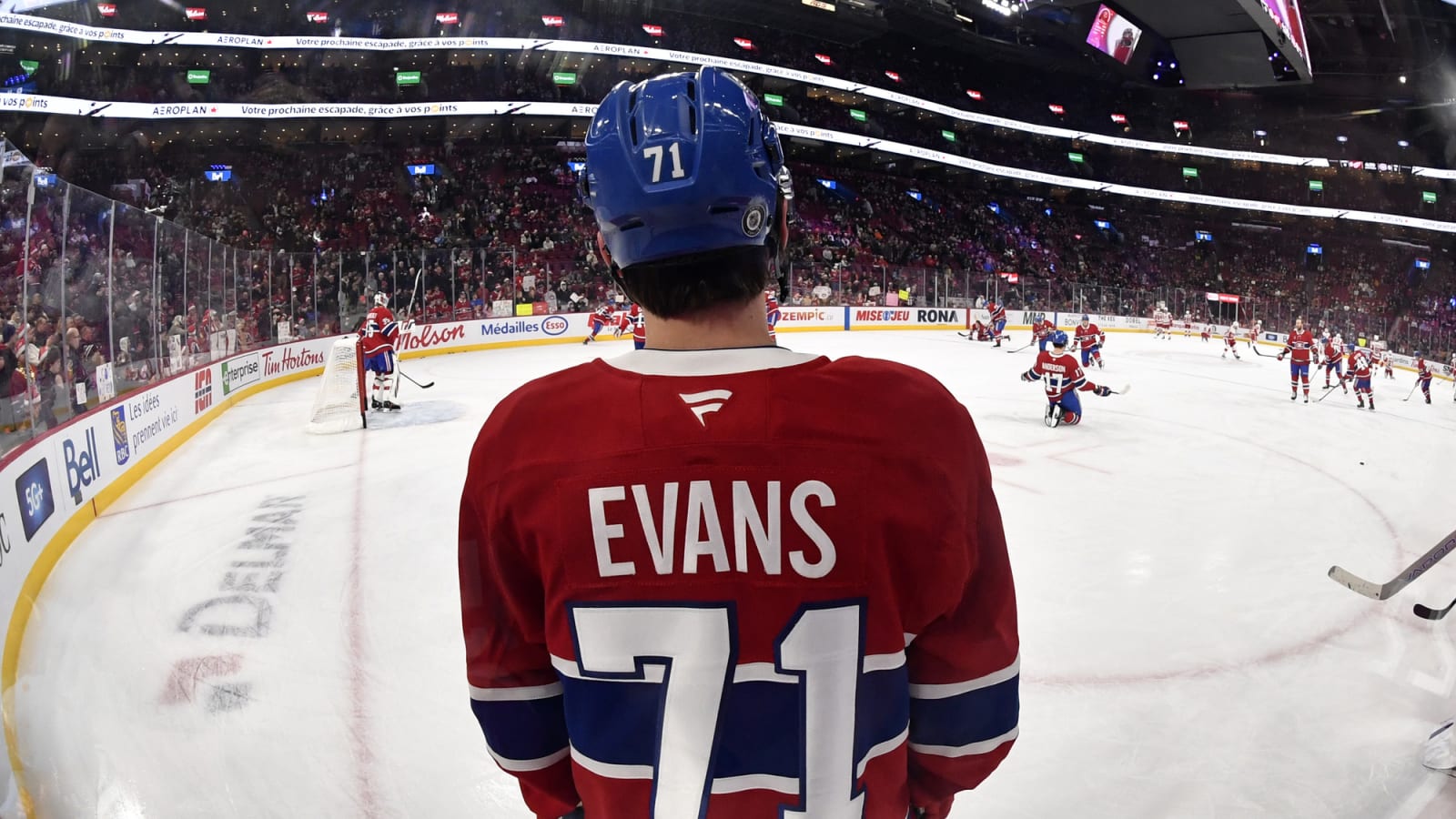
There was a fairly surprising announcement on Tuesday afternoon, as the Montreal Canadiens and Jake Evans agreed to a four-year contract extension. The deal runs until 2028-29, and carries a $2.85 million annual average value (AAV).
It’s a reversal of the situation to a certain extent, as all signs pointed to a trade prior to the deadline, with several teams interested in improving their penalty killing units prior to the playoffs. Teams such as the Edmonton Oilers, the Toronto Maple Leafs, the Winnipeg Jets, the New Jersey Devils, and the Minnesota Wild had called general manager Kent Hughes to discuss the framework of a potential deal, however, the Canadiens remained steadfast in their demands, reminding teams that they would only discuss serious offers.
Impact on Montreal Canadiens Roster
It’s quite clear that the Canadiens also remained unwavering with their offer to Evans, avoiding a situation in which they’d offer a rich contract to a player who is enjoying an inflated shooting percentage. After all, the ultimate management sin is being seduced by a temporary uptick in scoring.
With that in mind, it was Evans who bridged the gap between the team offer and his demands. It’s evidently a sign that the player took a hometown discount, a rarity in Montreal. Simply put, Evans believes in what the Canadiens are building something special, and he took a hit in the wallet to ensure he would continue his journey with a young organization that also possesses one of the best prospect pools in the NHL.
It also provides more proof that Montreal is no longer a market that players avoid at all costs, as it was during Marc Bergevin’s era.
The open communication established by the Hughes management group has not only provided a renewed sense of hope among fans, it has quickly and efficiently removed the stain of frustration from players that was inherited a few years ago.
Habs and Jake Evans’ camp renewed talks on Sunday after an extended period without. I think Montreal stuck pretty well to its position more or less. So Evans, in the end, made the call he didn’t want to leave.
— Pierre LeBrun (@PierreVLeBrun) March 4, 2025
Jake Evans isn’t a foundation piece of the lineup, but he does serve a few key roles, connoting that the Habs will not have to scramble to replace his fantastic play on the penalty kill, and his stalwart presence on the fourth line.
That may not seem like an important step, but it allows Hughes and Co. to focus on the bigger picture, rather than scrambling and spending assets to solidify the hole left behind by Evans.
The low cost of the deal also gives the Canadiens plenty of financial flexibility moving forward, especially since the NHL’s salary cap is set for a notable increase in the next five years. Rather than spending an extra million or two on Evans, those funds can be used to convince a top-tier player to join the team, or to secure a player who would otherwise test the open market in free agency.
Jake Evans with a strong drive to score while shorthanded.
1-0 #GoHabsGo pic.twitter.com/Q7Ezq2LoCY
— Marc Dumont (@MarcPDumont) December 6, 2024
Impact of Jake Evans Contract On The NHL Trade Deadline
The contract does not contain a no-trade clause (NTC) or a no-movement clause (NMC), which isn’t particularly surprising. Hughes rarely acquiesces to that caveat, with Jake Allen representing the only player who received a modified NTC from Montreal in the last few years.
It’s important to note with the upcoming NHL Trade Deadline, as some may interpret the contract as the first part of a sign-and-trade deal. That is not the case, and given that Evans went out of his way to accept a lower sum from the Canadiens than he would have gotten on the open market, not to mention Hughes’ reputation as a player-friendly general manager, there’s little to no chance Evans will be moved.
Therefore, we can safely say it probably won’t be a very busy trade deadline for the Habs, as they’ve taken their best asset off the market. There’s still a possibility someone such as Joel Armia or David Savard will be moved, but given the recent uptick in results from the Canadiens, not to mention their low value on the trade market, the potential return on such a trade is unlikely to move the needle in the grand scheme of things.
There’s still a chance the Canadiens may use their remaining cap space, roughly $6.6 million, to absorb an expiring contract in exchange for a mid-round pick, and they may even flip the script and acquire some depth reinforcements to improve their odds of qualifying for the playoffs, but a significant trade doesn’t seem to be in the cards.
Great individual effort by Jake Evans to score a shorthanded goal and make it 5-2 #GoHabsGo pic.twitter.com/a9V9ZuV1eD
— Marc Dumont (@MarcPDumont) April 3, 2024
More must-reads:
- Eight NHL players to watch at the upcoming Winter Olympics
- NFL hiring grades: Ravens, Steelers find themselves on opposite ends of the spectrum
- The '14-win NFL quarterbacks' quiz
Breaking News
Trending News
Customize Your Newsletter
 +
+
Get the latest news and rumors, customized to your favorite sports and teams. Emailed daily. Always free!








